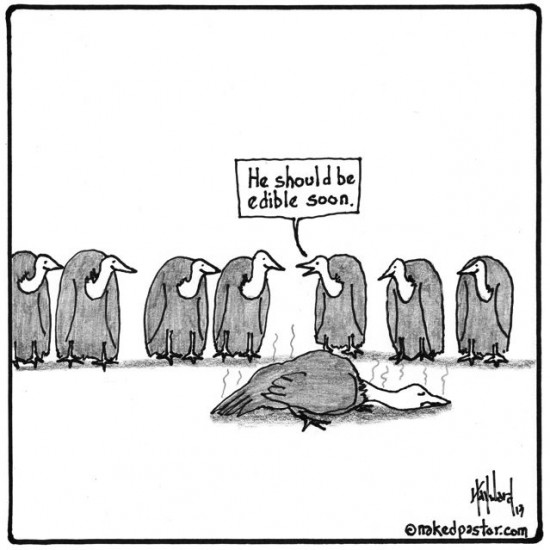
All adversaries are worthy. If they weren’t they wouldn’t be on the battlefield. This is always my assumption of all persons engaged in theological, ecclesiological and philosophical discussion in a public manner.
I was not surprised but saddened with some of the responses to the suicide of Rick Warren’s youngest son last week. But I’ve been cartooning and writing online long enough to know that vitriol finds full expression on the internet. I get it every day. But that’s the game. We play beneath the hungry stare of countless vultures.
I would like to share with you the way I try to critique. I might not always succeed, but I make sure to ask myself three questions when critiquing others. Rather than use Warren since I don’t think it is appropriate right now, I’m going to use a post I wrote yesterday as an example. The article I wrote critiquing Lee Grady is called “Women Leaders We Apparently Need to Avoid” because I asked myself these three questions to make sure it followed good critique etiquette. These are the three simple questions I would ask before I click enter:
1. Is this necessary and therefore constructive criticism?
This is always the first thing that motivates me to cartoon or write a critique: is it necessary? If it’s necessary then it has to be constructive because it is crucial to the lives of people. What I usually critique are things that I think damage people and the organizations we gather in. I don’t care about a lot of theology that is going on out there, but if there is theology that validates and supports inequality, abuse and the dehumanization of people, I’m on it. Why? Because I believe in people and want to see them set free. I believe that’s what Grady wants. So my hope is that the person I’m critiquing wants that for people too and doesn’t realize how self-destructive his theology is to that end. Usually the best time for this is when it is very evident, either in his words or deeds, that he is compromising peoples’ freedoms. Critiquing someone in the wake of a tragic death of his son is not such a time.
2. Am I critiquing his words and actions rather than maligning him?
When he sees or reads my critique, I hope he says, “Hm! I never really thought about it this way. Maybe I need to reconsider my position.” No one knows the motivations of a person, not even the person himself. They are beyond finding out. I know this not just because the bible tells me so (Jeremiah 17:9), but because I’m a critical observer of myself. A person is like the law: a lot of it is revealed in policies… that is, the words and deeds. I critiqued Grady hoping that he meant the best but missed it with his word choices. Never once do I malign him, but I do go after his words which might betray an underlying sexism that he isn’t aware of that infected his article. I wouldn’t want him to feel personally attacked, although I can’t help that if I believe my critique is fair. But I would want him to realize that the troops he put in the line of fire… his words… are under attack and as their commander he is responsible and should respond. Saying things that polarize people rather than ideas accomplishes nothing.
3. Does this highlight or hide the fact that he is my brother?
I try to work with what I believe is the correct assumption: that I and the person I am critiquing are one. I believe in the unity of all things and I endeavor to work towards the manifestation of that present reality at all times. Even in the middle of a heated debate, I try to always remember that I am fighting with my brother or sister and I want this to end well. At the end of the day I want us, no matter which way the argument may go, to be able to consider each other family still. Because we are! I believe Grady is my brother. I believe Warren is my brother. Joyce Meyer is my sister. I may disagree with what they say and do. And if I disagree enough because what they are saying or doing is harmful either to themselves or others, I’m going to say so because I care. My assumption is that we all want the same thing: the liberation of all people. Saying mean things about or to him is cheap and fruitless.
However, there are times when someone is doing something so harmful that I think they need to shut up or resign or they need to be fired or put away. I wished for years that Jack Schaap would shut up or resign or get fired or be put away because, as this disgusting video of him ranting against women reveals, he was harmful to the church and women and men. It turns out he was recently sentenced to 12 years in prison because of having sex with a minor… necessarily silenced by his own demise.
I also get frequently reprimanded for critiquing my “brothers and sisters in Christ” publicly and that the biblical way would be to first approach the person one on one. But that’s silly. When someone publishes something or publicly does something, then it is commonly understood it is fair game for critique. Mature players know this.
I extend my condolences to my brother Rick Warren during this tragic time. Vultures back off.











